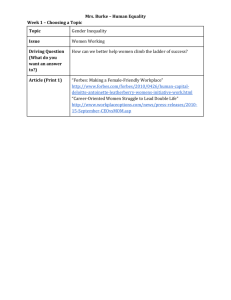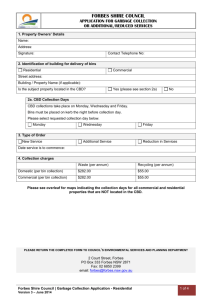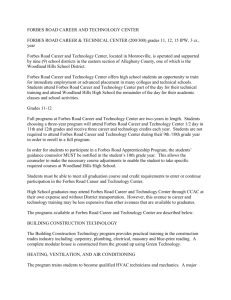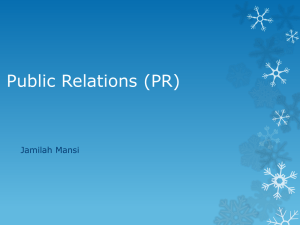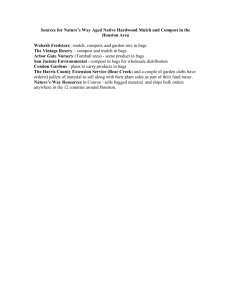A household action guide to a cleaner
advertisement
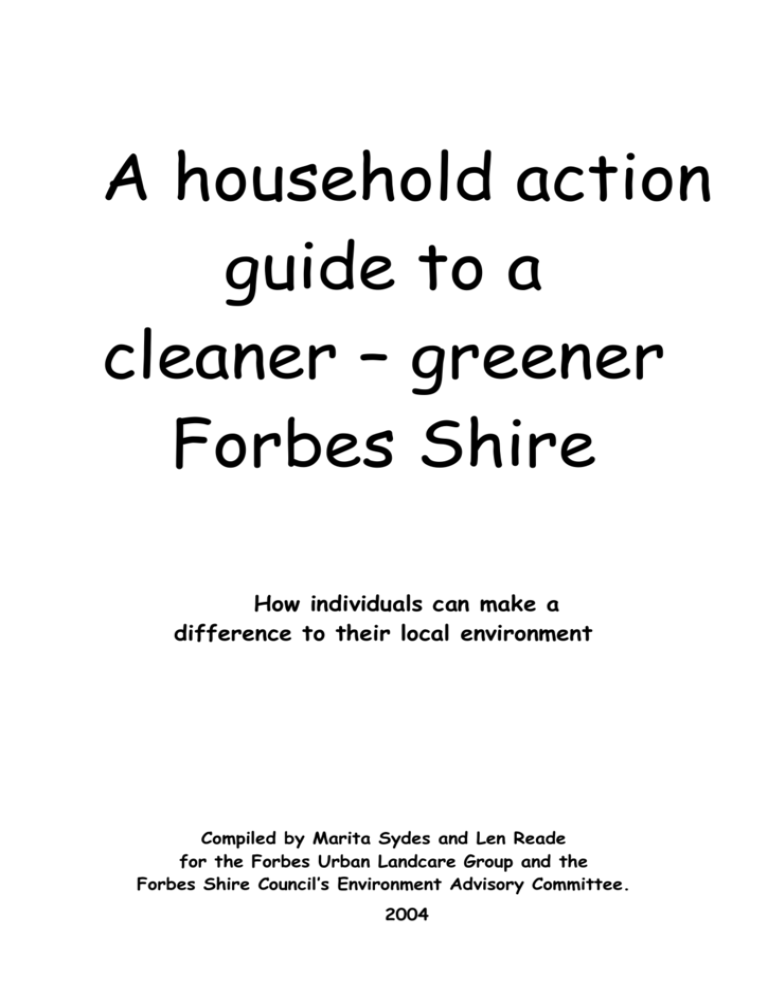
A household action guide to a cleaner – greener Forbes Shire How individuals can make a difference to their local environment Compiled by Marita Sydes and Len Reade for the Forbes Urban Landcare Group and the Forbes Shire Council’s Environment Advisory Committee. 2004 ACKNOWLEDGEMENTS We would like to thank the Parkes Urban Landcare Group and the Parkes Shire Council for allowing us to base this publication on the ‘Green Thumb Enviro Guide; How Parkes Residents can make a difference to our Environment’. Information for this booklet was contributed by members of the Forbes Urban Landcare Group and the Forbes Shire Council’s Environment Advisory Committee. Cartoons by Patrick Driver. The guide was printed and distributed by the Forbes Shire Council. DISCLAIMER Information in this booklet is intended as a guide only and was up to date at the time of publication. It is the responsibility of the individual to ensure that any methodology adopted or adapted from this booklet is suitable purposes intended. for the The authors and publishers cannot take responsibility for the misuse or abuse of any of the information in this publication. A household action guide to a cleaner – greener Forbes Shire How individuals can make a difference to their local environment FORBES URBAN LANDCARE GROUP INC. Compiled by Marita Sydes and Len Reade for the Forbes Urban Landcare Group and the Forbes Shire Council’s Environment Advisory Committee. 2004 A HOUSEHOLD ACTION GUIDE TO A CLEANER-GREENER FORBES SHIRE WHY PRODUCE THIS GUIDE? The primary objective in producing this personal action guide was to provide all residents within the Forbes Shire with ways that they can help in the sustainable use and management of resources within their local environment. More specifically the aims of this guide are to allow Forbes’ residents to take direct action in protecting their waterways, conserving water, reducing waste production, encouraging recycling and enhancing the local environment. If everyone adopts at least a few of the suggestions in this guide we would all be contributing to a healthier, more sustainable lifestyle in Forbes. BACKGROUND The production of this guide was possible through the cooperation between Forbes Urban Landcare Groups and the Forbes Shire Council’s Environment Advisory Committee. The aims of both groups are discussed briefly below. FORBES URBAN LANDCARE GROUP INC. FORBES URBAN LANDCARE GROUP is a volunteer organisation dedicated to doing what we can in our community to protect and preserve our local environment. Through Landcare, the local community including; businesses, schools, local industry, people within the township and farmers are working together to effectively use and manage our natural resources:- with the overall goal of promoting and enhancing a sustainable and productive environment. As a group, the Forbes Urban Landcare Group works on projects A HOUSEHOLD ACTION GUIDE TO A CLEANER-GREENER FORBES SHIRE aimed at restoring and improving the local environment. Activities undertaken by the group include; tree plantings on reserves and other sites, protecting remnant vegetation, improving drainage and water quality and community education. For more information on the activities of the Forbes Urban Landcare Group, or to get involved with the Landcare group and their activities please contact the Forbes Urban Landcare Group c/o PO Box 823, Forbes. The FORBES SHIRE COUNCIL’S ENVIRONMENT ADVISORY COMMITTEE is a committee that discusses and advisors the council on local environmental issues. The committee has representation from elected councillors, Forbes Shire Council staff, members representing local community interests and local state government representatives. is:- The purpose of the committee To enable council and the community to work together for the benefit of the environment. To provide a forum that will allow frank and open discussion on all issues relating to the environment. To make recommendations to Council on environmental issues. PLEASE KEEP THIS GUIDE IN A SAFE AND EASY TO FIND PLACE FOR YOUR QUICK REFERENCE. IT MAY ALSO BE AN IDEAL REFERENCE BOOKLET FOR SCHOOL PROJECTS AND ASSIGNMENTS. A HOUSEHOLD ACTION GUIDE TO A CLEANER-GREENER FORBES SHIRE TABLE OF CONTENTS SALINITY AND RISING WATER TABLES ................................ 1 Are you aware of salinity?......................................................................................... 1 Wurgle- who am I and what do I tell you? ............................................................ 1 What is it to be waterwise? ..................................................................................... 2 Waterwise in the garden ........................................................................................... 2 Waterwise lawn areas................................................................................................. 4 Waterwise in and around the home......................................................................... 4 Rainwater and re-use of greywater ........................................................................ 6 HEALTHY WATER AND WATERWAYS ..................................... 7 Where does your stormwater go? ........................................................................... 7 The Drain Is Just For Rain ....................................................................................... 7 Reducing pollution of our water from the garden ............................................... 8 Reducing pollution of our water from inside the home ...................................... 9 WASTE MANAGEMENT ..................................................... 9 Reducing waste generated....................................................................................... 10 Re-use whatever waste you can ............................................................................. 10 Recycle where possible ............................................................................................. 11 PLASTIC BAGS…. DO WE REALLY NEED THEM?? ...................... 11 BUYING GREEN OR SUSTAINABLE PRODUCTS ........................ 13 REDUCING GREEN WASTE IN LANDFILL ............................... 13 Composting .................................................................................................................. 15 Worm farms ................................................................................................................ 16 Organic mulch ............................................................................................................. 17 GET ENERGY SMART ...................................................... 17 Things to consider in a new home or a home renovation .................................. 18 GREENER BUSINESS TIPS ............................................... 19 A HOUSEHOLD ACTION GUIDE TO A CLEANER-GREENER FORBES SHIRE ENCOURAGING NATIVE ANIMALS AND PLANTS ..................... 20 Plant locally native species ..................................................................................... 20 Plant animal friendly gardens ................................................................................ 20 Nesting boxes for wildlife ...................................................................................... 21 See the benefits........................................................................................................ 21 LOCAL SERVICE DIRECTORY ............................................. 22 Australia Post Shop.................................................................................................. 22 Batteryworld .............................................................................................................. 22 Bernardis and Sullivans IGA supermarkets ....................................................... 22 Daroobalgie Landfill Waste Depot ....................................................................... 22 Enjo .............................................................................................................................. 23 Forbes TV and Video Repairs ................................................................................ 23 Lachlan Valley Building Recyclers ......................................................................... 23 Salvation Army Red Shield Family Store ........................................................... 23 St Vincent de Paul Store ........................................................................................ 23 Sunshine Club Opportunity Shop .......................................................................... 24 Twin City Recyclers .................................................................................................. 24 Woolworths ................................................................................................................ 24 A HOUSEHOLD ACTION GUIDE TO A CLEANER-GREENER FORBES SHIRE SALINITY AND RISING WATER TABLES Are you aware of salinity? Did you know that, just like in rural areas, overuse and pollution of our precious water resources leads to not only excess water bills but also rising water tables and salinity problems in urban areas. ground water and salinity problems in the shire, particularly within the urban areas of Forbes itself. Wurgle- who am I and what do I tell you? Have you seen me in the paper? Urban salinity is a growing problem in many towns, including Forbes, which can cause costly and unsightly damage affecting the whole community. While salinity in rural settings often lead to loss in productive lands, in an urban environment salinity can be equally as devastating. In some cases urban salinity can lead to the degradation of infrastructure such as road surfaces, kerbing, water and sewerage networks, as well as rising damp and fretting of brickwork in buildings or even difficulty in growing some plants and lawn in certain areas. In this booklet you will find many simple steps that individuals can take to help reduce the impacts of salinity in Forbes through the better use and management of our water. With more efficient and conservative use of our water, we as a community should be able to reduce the amount of water contributing to our rising Wurgle is a water use monitor for the town of Forbes. The figures given on Wurgle are the actual weekly water use and the long-term weekly average water use for the month we are currently in. If we are using less water than the long term weekly average Wurgle will smile, if more he will be sad. So, next time you see Wurgle in the paper, be sure to see how we are going as a town on water usage to the week. Page 1 A HOUSEHOLD ACTION GUIDE TO A CLEANER-GREENER FORBES SHIRE What is it to be waterwise? Being ‘waterwise’ means being aware of how we use water, both in the home and the garden. It also means being aware of where the water we use ends up. Regularly check soil moisture before and after watering to see how wet the soil is. Try growing drought tolerant Australian native plants instead of water thirsty exotic species. It is better to replace plants that die from lack of water with more hardy species than continuing to use more water than is necessary on the garden. Follow some of the tips below to conserve and protect our precious water resources. Waterwise in the garden Between three fifths (or 60 percent) of total household water consumption is used on the garden. Fortunately there is a lot that home gardeners can do to conserve and protect our water resources whether they have new gardens, established gardens, vegie patches or rosebeds. Watch the weather. Check the forecast for rain, showers or hot weather approaching and water accordingly. In the warmer months water in the evening or early in the morning to prevent evaporation. Plant waterwise species. Select species that do not require heavy watering and that are well adapted to the local climate and environmental conditions, especially with respect to hot summers and drought tolerance. Hibbertia obtusifolia (Hoary Guinea flower) A local woodland species Where possible use evergreen trees and shrubs in your garden, these drink water all year ‘round and therefore help to control the rising watertable. When planning or planting your garden, group plants that have similar water, soil and light preferences. Add organic matter (eg compost, blood and bone, or manure) to the soil; it will improve Page 2 A HOUSEHOLD ACTION GUIDE TO A CLEANER-GREENER FORBES SHIRE the soil so that it holds more water at the same time as adding nutrients for use by the plants. Water deeply - at weekly intervals rather than every day. This will encourage your plants to establish deep roots and some degree of drought tolerance. Save water with tap timers and trigger nozzle attachments for the hose and/or install water saving watering systems; eg drippers or pop up sprinklers that allow even precise watering and deliver water efficiently. Tap timers also help to prevent taps from being left on. Mulch all garden beds – mulching can reduce evaporation by up to 75% - use straw, newspaper, bark chips, pebbles, or recycled green waste etc. Mulch will also help to reduce rainfall run-off from your soil. Water around the base of your plants, not on the leaves. Control weeds as these take water from your plants. Waterwise display gardens While you’re thinking about being Waterwise why not visit the councils Waterwise Garden displays at Apex Park behind the playground and at Stokes Park in Elgin Street opposite the hospital. Or for more ideas about what species grow well in your local area, see what others are growing in your neighbourhood. There are some wonderful waterwise gardens planted at private homes in the shire. Page 3 A HOUSEHOLD ACTION GUIDE TO A CLEANER-GREENER FORBES SHIRE Waterwise lawn areas Watering lawns is a major contributor to urban salinity. In particular, over-watering of lawns contributes directly to high water tables – bringing to the surface salt that can damage house foundations and corrode pipes. Use organic fertilisers like ‘Blood and Bone’ to improve the water holding capacity of the soil as well as adding nutrients. Never water lawns in the heat of the day. Water early in the morning or in the evening. Below are some tips to maximise lawn watering efficiency. Reduce grassed areas - this will save on mowing time and save water. Replace unused lawn areas with groundcovers, well-mulched garden beds or pavers. Take the grass catcher off the mower – leave clippings on the lawn as they make good mulch and help retain soil moisture. Waterwise in and around the home Limit watering the lawn only water if your lawn is showing signs of stress such as loosing colour. Despite Australia being one of the driest inhabited continents our household consumption of water is one of the highest in the world. Our overuse of water has caused major salinity problems in both urban and rural areas. Don’t cut your grass too short. Longer grass will mean that the soil surface is shaded, reducing loss of water through evaporation. You’d be surprised how much water everyday activities consume. The average household uses around 900 litres of water every day. Washing machines use about 150 Page 4 A HOUSEHOLD ACTION GUIDE TO A CLEANER-GREENER FORBES SHIRE litres, dishwashers 50 litres and long showers can use 200 litres. Plug the sink when rinsing vegies or plates etc. Heres some really easy ways to reduce water use in the home. Get water saving shower heads and taps, or take a bath – a half filled bath uses less water than a long shower. Look for appliances that reduce water use. Showerheads, dishwashers, washing machines and toilets with high water efficiency are rated AAA and higher. Front loading washing machines save on water, energy and detergent. Use a broom instead of the hose to clean paths and driveways. Use the water meter to check for leaks in the plumbing and appliances. Use pool covers to reduce evaporation. Use a bucket and not the hose to wash the car. Direct water from air conditioners onto the garden. Only operate full dishwashers and washing machines. Where possible, match the setting on the washing machine with the amount of laundry to be washed. Turn off taps when cleaning teeth or shaving – save 5 litres water. Store drinking water in the fridge rather than letting the tap run every time you want a cool glass of water. Repair all dripping taps – a continuously dripping tap can mean up to 600 litres of water is wasted a day. Install dual flush toilet, check the cistern for leaks, and avoid flushing the toilet unnecessarily. Alternatively reduce the water used for each flush by placing a brick, litre bottle of water or a partly filled wine bladder in your cistern. Page 5 A HOUSEHOLD ACTION GUIDE TO A CLEANER-GREENER FORBES SHIRE Rainwater greywater and re-use of Two simple ways that you can help with the conservation of our precious water, especially in times of drought or low water storages, is to supplement your water supply with rainwater or through the re-use of grey water. Rainwater tanks Installing a rainwater tank is a way you can top up your water supply. See council for further information on the installation of rainwater tanks on your property. Grey water reuse Grey water is household wastewater that has not come into contact with toilet waste. It comes from the kitchen sink, dishwasher, bath, shower, hand washbasins, the washing machine or the laundry trough. If you are wishing to reuse greywater in the long term, reuse should be in accordance with the grey water reuse policy and as required by legislation (contact your local council, the EPA or NSW Health department for details of the current regulations and/or restrictions). There are restrictions on the use of greywater. For example, greywater from the shower cannot be directly diverted onto garden through permanent changes to the plumbing of the building without prior approval. For up to date advice contact your local council. However, some general guidelines for greywater reuse follow; Grey water cannot be re-used for drinking or other domestic uses such as food preparations, washing clothes, or topping up swimming pools. Some types of greywater can be used relatively safely for garden watering. For example, greywater from the bath, shower, hand basin, laundry trough and washing machine (final rinse only). Greywater from the kitchen sink and dishwahser should not be reused on the garden as these can contain heavy loads of organic matter, fat and caustic additives. The tips for water conservation around the home listed above were primarily sourced from www.waterwise.nsw.gov.au. Page 6 A HOUSEHOLD ACTION GUIDE TO A CLEANER-GREENER FORBES SHIRE HEALTHY WATER AND WATERWAYS Where does your stormwater go? Did you know that everything that goes down the drain either at home or in the streets ends up in local creeks and waterways like the Lachlan River and Lake Forbes. Gutters and drains take stormwater from our streets straight into rivers and lakes. Unlike, wastewater that is treated through our sewerage plant, urban stormwater enters our waterways untreated. So when it rains, stormwater can carry with it pollution from around our homes and streets directly into the waterways where we swim and where animals and plants live. If we stop pollution entering the gutters and drains in the first place we can help to keep our waterways clean and healthy. That way we will provide a better environment for us and for plants and animals. The Drain Is Just For Rain Have you seen this slogan stencilled on the gutters and drains around Forbes? The Drain is Just for Rain campaign in the shopping district of Forbes is to show that if people put litter down the drain, it ends up polluting the waterways where we swim, fish and go boating. What goes down the drain can be toxic for wildlife, and can make swimming or fishing unpleasant or even unhealthy. For more information on the “THE DRAIN IS JUST OR RAIN” campaign visit the Environmental Protection Agency’s stormwater website (www.epa.nsw.gov.au/stormwater). The tips for healthier and cleaner waterways listed below were primarily sourced from the Department of Infrastructure, Planning and Natural Resources ( www.dipnr.nsw.gov.au ). Page 7 A HOUSEHOLD ACTION GUIDE TO A CLEANER-GREENER FORBES SHIRE Reducing pollution of our water from the garden There are many things that can be done around the garden to help reduce the run-off of excess nutrients, pesticides and herbicides to stormwater. Avoid bare patches of to reduce runoff contamination of drains. This helps to prevent evaporation capillary action that can bring to the soil surface. Keep paths and gutters free of dirt and rubbish. Rubbish in gutters and on paths is often washed directly into Lake Forbes, the Lachlan River or other nearby watercourses during rain events. Wash your car on your lawn or at a commercial carwash facility - It is illegal to discharge soapy carwash water to the gutter. Install a rainwater tank. Run-off from many roofs go directly into the ground water via rubble drains or directly to the kerbside gutters to contribute to stormwater run off. Rainwater tanks can catch stormwater that can be used at a later date for many things around the yard and house, including watering the garden. Below are some suggestions for the ways you can help keep our waterways healthy and clean. Use compost or manure instead of fertiliser – excess fertiliser finds its way into surface and ground water, eventually ending up in stormwater drains and creeks etc. In the case of Forbes township – often into Lake Forbes, and contributing blue-green algae blooms. Plant pest tolerant species and use natural repellents to reduce pesticide use. Pesticides washed into our waterways can kill fish and other freshwater life. Use chemical free and/or natural pesticides where possible in the garden. Page 8 soil and also and salt A HOUSEHOLD ACTION GUIDE TO A CLEANER-GREENER FORBES SHIRE Reducing pollution of our water from inside the home Many of the products we use daily such as detergents and oils contribute to pollution of our waterways. Here are some simple ways to help reduce pollutants from the home entering and contaminating our waterways. Use biodegradable household cleaning products where possible. Use low phosphorus detergents in the laundry and kitchen. Dispose of unwanted household waste such as old paints, solvents, motor oils etc to approved disposal sites. Use a sink strainer in the kitchen to avoid letting vegie scraps and other materials entering sinks and drains. For details of places where unwanted household waste products (such as sump oil) can be recycled in Forbes see the “Local Service Directory” section at the end of this guide. WASTE MANAGEMENT Have you ever thought about the role you play in creating waste? We all create waste so we all need to be part of helping to reduce waste. As a community we can all learn together about practical ways we can make much less waste. REDUCE RECYCLE Follow the 3 R’s in reducing waste! Reduce, Re-use and Recycle!! It is better to REDUCE the amount of waste generated in the first place and if you can’t reduce it the next best option is to RE-USE whatever waste you can and finally it is important to RECYCLE as much as you can of the remaining waste. RE-USE Page 9 A HOUSEHOLD ACTION GUIDE TO A CLEANER-GREENER FORBES SHIRE Reducing waste generated This simply means to create the as little as possible waste in the first place. Ways of reducing waste include; Avoiding purchasing unnecessary products. Choose products that have minimum packaging, and where possible choosing products with locally recyclable packaging. Buy products concentrated form. Using and re-using durable and repairable products rather than disposable products. in bulk or Put a “NO JUNK MAIL PLEASE” sticker on your post box. Re-use whatever waste you can require reprocessing between uses. In helping to reduce waste the key is to consider that items that are no longer needed by you may be able to be used by someone else. Here are some examples that you may want to try; Re-use packaging such as food containers, glass jars etc. Re-use plastic bags within the house. Organise a garage sale with friends and/or neighbours to sell unwanted but useful household items. Don’t throw away second hand clothing, furniture, building materials or car parts etc. There are many businesses dedicated to re-using or selling second hand materials. Re-using items again and again is a quick and easy method that does not Page 10 A HOUSEHOLD ACTION GUIDE TO A CLEANER-GREENER FORBES SHIRE Recycle where possible Recycling involves taking a used product and breaking down the materials it is made of and using those materials to make something new. Recycling saves natural resources, conserves energy, curbs the greenhouse effect and reduces water usage and pollution. Recyclable on a product simply means that it is possible to recycle the material and somewhere in the world, a process exists to recycle the item – but it is important to note that it may not be practical to do so. You need to know what local collection and processing systems are in place . Common household waste items that can be easily collected for recycling include; glass, aluminium, paper, some plastics, food and garden waste, steel, oil and motor vehicle batteries just as a start. For details of places that can re-use items or where waste items can be recycled in Forbes see the “Local Service Directory” section at the end of this guide. Recycle where possible to reduce that amount of household waste going onto landfill. PLASTIC BAGS…. DO WE REALLY NEED THEM?? Below are some alarming facts from Planet Ark on plastic bags. Australians use an estimated 7 billion plastic checkout bags each year (that’s nearly one bag per person per day). Plastic bags take between 15 and 1000 years to break down in the environment. In the environment, plastic bags can be lethal - killing birds, whales, seals and turtles. On land, plastic bags can block drains, and contribute to litter. At least 80 million plastic bags end up as litter on our beaches, streets and parks - with Page 11 A HOUSEHOLD ACTION GUIDE TO A CLEANER-GREENER FORBES SHIRE governments spending over $200 million a year picking up litter. be sure to drop off your excess plastic shopping bags for recycling. To help combat the problems associated with plastic bags the Federal Government and the Australia Retailers Association have set up a voluntary agreement to reduce the consumption of single use plastic bags by 25% by the end of December 2004, and by 50% by December 2005. With a possible total phasing out of single use plastic shopping bags by the year 2009. Secondly, one of the most effective ways to prevent plastic bags contributing to rubbish in our towns and waterways is to reduce our use of them. Either by re-using your existing plastic bags or better still by avoiding plastic bags in the first place. Be sure to ask yourself the following questions before accepting your next single-use plastic bag... Until the use of single use plastic bags is banned, there are many things that individuals can do to help reduce the impact of plastic bags on our environment. Firstly, most large supermarket stores and plastic recycling centres now accept empty plastic checkout bags for recycling. So where possible Do you really need a plastic bag for every purchase? Could you use reusable bag instead? Could you get the groceries packed into cardboard boxes instead of plastic bags (and reuse or recycle these cardboard boxes)? Page 12 A HOUSEHOLD ACTION GUIDE TO A CLEANER-GREENER FORBES SHIRE WITH FORBES BUSINESSES AND COMMUNITY MEMBERS WORKING TOGETHER, COULD WE BE ONE OF THE FIRST TOWNS IN THE CENTRAL WEST TO BECOME PLASTIC BAG FREE??? BUYING GREEN OR SUSTAINABLE PRODUCTS The power of the consumer’s dollar can be used to create a higher demand and therefore production of sustainable products. Here are some things to consider when trying to buy green or sustainable products. Aim for less packaging – try to avoid products that have excessive or unnecessary packaging. Make sure the products you buy have recyclable packaging that can be recycled in your area. Think of the waste that will be generated as a result of you buying that item and choose products accordingly. Buy products that have a recycled content in their packaging. By buying products with recycled content we increase the demand for recycled materials and support Australia’s recycling industries. Buy products made from recycled materials. Some products themselves are made from recycled materials. Use biodegradable detergent and vegetable based cleaning products. Refuse single-use plastic shopping bags, use reusable bags or ask for cardboard boxes that can be re-used or recycled. REDUCING GREEN WASTE IN LANDFILL On average about half of the garbage put out by households is organic material, such as food scraps and garden waste. Most of this organic material can be composted at home or fed to worms in worm farms. Garden waste such as lawn clippings or leaves can be composted or used directly on the garden as mulch. While larger garden waste such as branches can be mulched or chipped and used as mulch on gardens. Page 13 A HOUSEHOLD ACTION GUIDE TO A CLEANER-GREENER FORBES SHIRE Page 14 A HOUSEHOLD ACTION GUIDE TO A CLEANER-GREENER FORBES SHIRE Composting Composting greatly reduces the volume of your garbage. Further, by keeping organic waste out of landfills the amount of toxic leachate is also greatly reduced. If you are thinking of setting up a compost system try and re-use second hand materials such as pallets, wood, mesh, timber and bricks. If buying a bin, consider one from recycled products such as plastic. Composting is a natural recycling process where plant and animal tissue is transformed into a very useful product that can be given back to our gardens reducing our need for synthetic fertilisers and excess water. So now you might in interested in creating your own compost heap but what materials should you use? The answer is simple anything organic (ie anything that was part of a plant or animal) but diversity of materials is the key to top quality compost. Air through the compost heap encourages the non-smelly aerobic bacteria to breed and do the decomposing so the more air the less smell. You need to ensure your compost can breathe some ideas to do this include adding layers of coarse organic matter such as tree clippings, or turn your compost heap once every one to two weeks and make sure that the structure or bin you have the compost in has holes in the top and sides to allow the air to flow through it. Your compost heap should be moist to touch but not wet. A sprinkling of lime onto your compost heap is useful when pests such as mites, vinegar flies, maggots, slugs occur or if a sour smell develops. Your finished compost is an organically enriched soil product that can be used in your garden and potted plants as a natural alternative to costly and potentially dangerous fertilisers. Compost will help to Page 15 A HOUSEHOLD ACTION GUIDE TO A CLEANER-GREENER FORBES SHIRE improve your productivity. soil quality and Choose a container for your worm farm that is well drained at the base (cut more holes if necessary). Layer a 5 – 10 cm bed of course gravel at the base of your container and then layer with weed fabric or shadecloth. Add some bedding material (eg, damp coir, straw and manure such as aged horse manure). Add your compost worms, feed them with food scraps and cover with damp hessian or carpet. Keep feeding the worms until full of castings the scoop castings out and start again. Worm farms Keeping compost worms in containers and feeding them fruit and vegetatble scraps (excluding onions and citrus, and meat and dairy products), paper and cardboard is another cheap and simple way to cut down on the garbage you throw away. As a bonus, the worms produce a wonderful garden fertiliser – worm casting. Suitable containers for keeping worms include wooden boxes, stackable worm farms and other commercially available worm factories. Homemade worm farms can be made with old bathtubs, foam boxes or whatever container you can find. Worm casting produced by a worm farm can be used to make a liquid fertiliser for your garden. Simply add two generous handfuls of casting to a 9 litre bucket of water. Stir and apply to the base of you favourite plants. Some important tips remember about your worm farm; Don’t overfeed your worms. Don’t over water your worms. Chop up the food scarps so the worms can process them quicker. Dust the bedding with lime if you see pests such as mites, vinegar flies, maggots, slugs or if a sour smell develops. Think of your worms as pets, if you go away have someone feed them. Here are some easy steps to follow to create a worm farm. Choose a spot for your new worm farm that is cool, shady and out of direct rain. to Page 16 A HOUSEHOLD ACTION GUIDE TO A CLEANER-GREENER FORBES SHIRE Organic mulch Larger organic garden waste is not suitable for home composting or use as mulch unless it has been chipped or shredded. Once organic mulch has been created it can be applied to the surface of gardens or even revegetation projects. A thick layer of mulch (15 – 20 cm) will reduce water loss and suppress weed growth. Households may have or have access to a chipper / shredder / mulcher that can chip or shred leaves, twigs and small branches. These are usually somewhat noisy but are relatively effective for processing smaller garden waste items. However, for larger branches etc you will have to consider dropping garden waste at a depot with a suitable shredder / mulcher. For details of where larger green waste items can be mulched in Forbes see the “Local Service Directory” section at the end of this guide. Garden mulch is available free to local residents from the Daroobalgie Landfill Waste Depot. Page 17 A HOUSEHOLD ACTION GUIDE TO A CLEANER-GREENER FORBES SHIRE GET ENERGY SMART More than 40 million tonnes of harmful greenhouse gas emissions are attributed to the electricity consumption of Australia's six million homes every year - that's 25% of the total amount of greenhouse gas produced due to the use of electricity and gas. Reduced domestic energy use will have a significant impact on greenhouse gas emissions, thereby reducing the impact of climate change. Consider installing power or solar hot water. Turn off pilot lights for gas heaters in summer. Fill the kettle or jug with only the water you need. Wash clothes in cold water and where ever possible dry them on the line. Install adequate insulation in your home. Wear more or less clothes instead of relying on heating and cooling. While cooking, use lids on the pots and simmer gently rather than boiling rapidly. Or use a microwave (a microwave uses 70% less electricity). The bathroom uses approximately 65% of household hot water, by restricting length of showers, or installing water Below are some energy saving things you can do in your existing house by implementing even a few small changes around your home, you could be making big savings. Turn off appliances, lights and computers etc while not in use (studies estimate that 10% of power usage at home is by appliances on standby). Use compact fluorescent light bulbs in rooms where lights are on for a long period. Become a subscriber of Green Power – energy produced from renewable resources (nondepleting) such as solar, wind and water. Contact your energy supplier for more information. Page 17 solar A HOUSEHOLD ACTION GUIDE TO A CLEANER-GREENER FORBES SHIRE saving showerheads big savings on hot water usage can be made. your home as comfortable and energy efficient as possible. Install draught seals around doors and windows. An Energy Smart Home looks just like any other home but uses the best combination of building orientation, wall and ceiling insulation, efficient heating, cooling, hot water, lighting and appliances to reduce household energy consumption by up to 40%. Choose low energy rated appliances where possible (the more stars on the energy rating sticker the better). Shade hot windows in summer to reduce heat absorption. Fit heavy drapes or blinds, or double glaze windows to reduce heat loss in winter. Do not overheat or overcool a room – every one degree in temperature can increase heating or cooling bills and emissions by 10%. Things to consider in a new home or a home renovation If you are renovating or building your home, you have the perfect opportunity to save money, and make Because Energy Smart Homes use significantly less energy than conventional homes, they can save you hundreds of dollars on your energy bills and help protect our environment by reducing greenhouse pollution. An energy smart home includes design alternatives - such as passive solar design and energy efficient water heating - that dramatically reduce the need for non-renewable energy and artificial heating and cooling, reduce household energy bills and greenhouse gas emissions, and make homes more comfortable to live in. Information from this section was sourced from the Sustainable Energy Development Authority (SEDA) homepage. For more information on Energy Smart homes visit the following websites; www.seda.nsw.gov.au www.energysmart.com.au Page 18 A HOUSEHOLD ACTION GUIDE TO A CLEANER-GREENER FORBES SHIRE GREENER BUSINESS TIPS With many households now doing their best to recycle or limit waste and pollution, as well as conserve energy it is time for businesses to use their initiative and find out where they too can recycle or conserve. The tips below are just some of the ways that environmentally friendly work practices can be introduced into the workplace at no or little cost to your business. Insist on double-sided printing where possible. Implement a paper recycling system. Re-use envelopes. Purchase products produced with a recycled content (eg toilet paper, paper towel or office paper). In the tea-room have china mugs and steel cutlery available for staff and visitors or clients. Start recycling electronic waste such as mobile phones, photocopier and printer cartridges. Limit your use of plastic bags, encourage customers to use reusable bags, paper bags or better still no bags where possible. Provide consumers with options other than plastic bags for their purchases (eg an option of no bag, paper bags, reusable cloth or go-green bags, boxes or at the least shopping bags made from recycled plastics). Subscribe to ‘Green Power’ – energy produced from renewable resources such as solar, wind and water. More information can be found at these websites; www.wrapp.nsw.gov.au www.livingthing.net.au www.epa.nsw.gov.au www.ecooffice.com.au/how Page 19 A HOUSEHOLD ACTION GUIDE TO A CLEANER-GREENER FORBES SHIRE ENCOURAGING NATIVE ANIMALS AND PLANTS Why not create a fauna haven in your backyard? Whether it’s a small corner or the entire space, a wild life habitat will benefit you, your garden and all sorts of native creatures. Plant locally native species Where possible include local native species in your garden to help encourage local native wildlife. For information on the propagation and identification of local native plant trees and shrubs see Sydes et al. (2003). A Practical Guide to Revegetation in the Mid Lachlan Region (available from the Department of Infrastructure, Planning and Natural Resources office in Parkes). Plant animal friendly gardens To attract native birds, frogs, butterflies, lizards and other animals: Plant natives among other plants (plan for year round flowering). Provide water in the garden (freshwater is a magnet for wildlife). You will need to seal the base of any ponds created. Select species for your garden that provide nectar as a food source for butterflies and birds (eg daisies, bottlebrushes, banksias, gum trees, correas, native pea species) Plant some spiky bushes (animals can hide from predators). Leave leaf litter and branches in the garden (provides protection and food for animals). Page 20 A HOUSEHOLD ACTION GUIDE TO A CLEANER-GREENER FORBES SHIRE Plant tussocky native plants (provide seed and protection for frogs and small mammals and food for many caterpillar species). Establish reedy plants around water’s edge (they’ll become important breeding sites for frogs). Be a responsible cat owner keep your cat inside as much as possible, and always at night. Even just a few carefully selected wildlife – friendly plants can boost the number and variety of wild creatures that visit your garden. The needs and habitat of your target species. Ensure nesting box opening is protected from the harsh weather (eg, hot sun and rain etc). Don’t install too low – ground predators may raid the nest. Monitor the box regularly, although be careful not to disturb the inhabitants. If the box is tied to a tree with wire, be sure to loosen wire when necessary. Avoid feeding the animals or birds, they may become dependant on you and stop feeding for themselves. Your local National Parks and Wildlife Service can help with advice on what birds and animals you would find in your area. See the benefits Nesting boxes for wildlife Consider building and erecting nest boxes in your yard to house wildlife. Be sure to consider; Besides enjoying observing what animals and birds might establish in your nesting boxes, the native animals you attract will feed on pests in your garden, you may be able to extend a helping hand to some of our threatened and declining species of birds and animals. Page 21 A HOUSEHOLD ACTION GUIDE TO A CLEANER-GREENER FORBES SHIRE LOCAL SERVICE DIRECTORY Businesses, service or product providers listed here were sourced through an advertisement placed in the Forbes Advocate over the period of a month (February 2004), through local contacts and from information sourced from Planet Ark’s RecyclingNearYou website; The following is not intended to be a complete list of suppliers and the inclusion here of an individual, organisation or business is not necessarily an endorsement of their product or service. www.recyclingnearyou.com.au. Australia Post Shop 118 Lachlan Street, Forbes 2871. Phone: 6850 2950 Over the Christmas – New Year period is a drop off point for recycling of Christmas cards. Used printer cartridge drop-off point. Batteryworld Lot 4 Parkes Road , Forbes 2871. Phone: 6851 5401 Mobile phone recycling. Bernardis and Sullivans IGA supermarkets Lachlan and Bandon St Forbes. Has for sale reusable shopping bags. Daroobalgie Landfill Waste Depot Hoopers Road, Forbes 2871. Mobile: 0417 203 761 Organic garden waste (grass clippings, branches, garden prunings etc..) Whitegoods Scrap metal including steel food cans, car bodies and fencing wire Page 22 A HOUSEHOLD ACTION GUIDE TO A CLEANER-GREENER FORBES SHIRE Sump oil Untreated timber Glass bottles and jars Aluminium cans and foil Car batteries Second goods shop and sales Garden mulch free to residents Enjo Laurel Hull, Phone: 6852 1862 Environmentally friendly cleaning fibres. Forbes TV and Video Repairs 132 Rankin Street, Forbes 2871. Phone: 6852 2921 Mobile phone recycling and VCRs for parts and reuse within the store. Lachlan Valley Building Recyclers Merino Street, Forbes. Phone: 6851 4790 Bricks, concrete, roof tiles, terracotta pipes Building materials Fees may apply. Salvation Army Red Shield Family Store Browne Street, Forbes. Phone: 6851 1125 Take donations of second hand clothing, shoes, books, toys, kitchenware, furniture and electrical. Anything that has a resale value. St Vincent de Paul Store 109 Rankin Street, Forbes. Phone: 6852 1865 Page 23 A HOUSEHOLD ACTION GUIDE TO A CLEANER-GREENER FORBES SHIRE Take donations of second hand clothing, books, toys, shoes, crockery, glassware and cookware, blankets, and rags. Do not accept furniture or electrical goods. Sunshine Club Opportunity Shop Templar Street, Forbes. Phone: 6851 4028 Take donations of second hand clothing, shoes, books, toys, kitchenware, furniture and electrical. Anything that has a resale value. Will accept glass jam jars with lids for reuse within the store. Twin City Recyclers 2 Oxford Street, Forbes 2871 Ph/Fax: 6851 5222, Mobile: 0428 512292, Email: gordonjoybrown@ozemail.com.au Collections of cardboard / paper from business houses in both Forbes and Parkes for a small monthly fee. Bins / bags provided. 24 hour drop off point at premises in Oxford Street for; all paper, cardboard, newspapers, aluminium cans, plastic shopping bags, plastic milk cartons (no. 2 - HDPE), plastic soft drink bottles (no. 1 – PET ), and all other plastics marked with the recycle numbers 1 or 2. Drum Muster collection agency. All drums must be thoroughly rinsed and have lids removed before bringing them into Twin City Recyclers, where they must be checked by one of our registered staff. Woolworths Rankin Street, Forbes. Accepts plastic shopping bags for recycling Has for sale reusable shopping bags. Page 24
